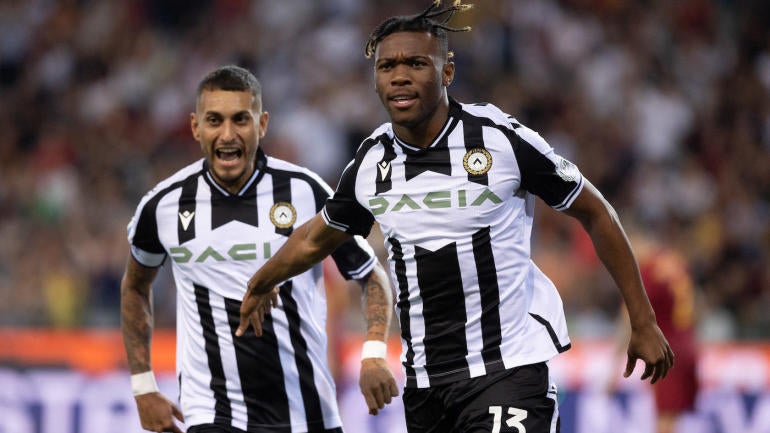
If you take a quick glance at the Serie A table through seven matches, you will notice Napoli and Atalanta at the top with 17 points apiece, which could be surprising to some. More surprising to a casual fan is the fact that Udinese, a team that finished mid-table last season, is only one point behind the pace.
As we return to Serie A game after the international break, Udinese have a date with Hellas Verona on Monday (2:45 p.m. ET | Paramount+). Last season, it took 24 matchweeks for the Bianconeri from northeastern Italy to reach five wins and 15 to match their current points total (16) this season. They already notched five wins under their belt with one draw and the lone loss coming on opening day against Serie A champions AC Milan at San Siro.
Udinese's Cinderella run surprised most of the critics and fans, but that should not be the case if you look at how the club works. Led by owner Giampaolo Pozzo, whose son Gino owns English side Watford FC, the club has always tried to create a roster where players could develop and become stars.
The project has shown signs of success in the past as the club reached the UEFA Champions League group stage in the 2005-06 season thanks to a historical fourth place finish in the previous season under Luciano Spalletti who later took the AS Roma coaching job.
There is an infinite list of young talents discovered by Udinese in the past decade or so. Alexis Sanchez, Rodrigo De Paul or Samir Handanovic are just a few names that come to mind. There were some years where things didn't go as planned and the club staved off relegation a few times, but after the return of technical director Pierpaolo Marino, things seemed to be back to normality.
A longterm project
Sustainability is the key word for a club the likes of Udinese. They managed to discover talents in the past because of their innovative scouting system built through the years. When modern technology completely overturned the way scouts and the clubs operate, Udinese had to find a way to adapt.
There were a few reasons as to why they were considered as one of the bests in the past. Not only did they have a knack for identifying talent, but they also established a revolutionary system that made them the quickest club to find new players. Behind the scenes in Udine, they created their own secret scouting platform and had a room with more than 20 televisions where they could watch players from all over the world. They were able to capitalize off of a market inefficiency.
Suddenly, everything changed when technology made it easier for game access to become available to the public, regardless of whether they were involved in the sport or not. These days, platforms such as Wyscout can provide clubs and directors data and video footage of basically every single player around the globe. With the advent of this new system of work, Udinese found a way to stay at the top and remain arguably one of the best European clubs at unearthing young talents, but it predictably took them some time to adapt.
Last May, technical director Pierpaolo Marino spoke to CBS Sports and explained really well how they work with talents and their players: "We usually have a two-to-three-year project for every player. Then it can happen that things change in a positive or a negative way, but there is always a strategy for the talents that arrive here. Our strategy is clear, be first and anticipate our competitors also through good relations with other clubs and agents. Also, we want players that don't have to be crucial for us in their first year, they need time to grow. The first year they need to be in competition with the starter and then potentially become crucial for us in their second year. With this mindset we give them time to grow."
Craving even more coverage of the world's game? Listen below and follow ¡Qué Golazo! A Daily CBS Soccer Podcast where we take you beyond the pitch and around the globe for commentary, previews, recaps and more.
The summer business
Over the summer, the club made some staff changes by parting ways with Gabriele Cioffi and appointing Andrea Sottil from Ascoli as the new manager. The new manager brought some new ideas and a fresh perspective to the club which provided a much-needed ambiance inside the dressing room.
Most importantly, Udinese worked really well in the transfer window and kept at the club key players such as Gerard Deulofeu, who seemed to be on the verge to leave the club for many weeks, and Beto. There were some exits to deal with, however. Brandon Soppy joined Atalanta for around €10 million and Nahuel Molina joined Atletico Madrid for approximately €27 million in a swap deal that included Nehuen Perez going to Udinese.
The most important move of the summer was when Udinese managed to keep 19-year-old Italian left-back Destiny Udogie, arguably one of the best young Serie A players at that position, for another season. Udogie will join Tottenham next season for around €20 million. It's an important signing for Spurs, sure, but this move also gives Udinese the runway to have Udogie sharpen his craft for another season before joining the Premier League in the summer 2023.
Udinese's surprising run to the top half of the table may not end in Champions League qualification, but it's also an important time for a club that has managed to claw its way back on track after nearly falling to the second division. Make no mistake, Udinese are one of the greatest examples in soccer of ideas and planning being just as important as the financial resources in order for a club to produce results.





















